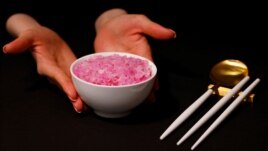23 March 2024
South Korean researchers have combined cow muscle cells with rice grains. They say the new rice is an important step towards a sustainable, less costly source of protein. The researchers suggested it could replace the meat of farmed cattle, or beef.
Professor Jinkee Hong of Yonsei University led the research. Hong said the "beef rice" is the first product of its kind. The results of the research were recently published in Matter.
The beef rice uses grain particles as the base for growing animal muscle and fat cells.

Hybrid beef rice, elaborated using cow muscle and fat stem cells, is set on a table at the Reuters studio in Seoul, South Korea, March 8, 2024. (REUTERS/Kim Soo-hyeon)
The researchers treated rice grains with chemicals called enzymes to create an environment for cell growth. They added cells from cattle to create the final product, which is a combination, or hybrid, of the two. The result looks like a grain of rice with a pink color.
Companies around the world have launched efforts to develop meat that is grown in a laboratory. One of the latest attempts involves plant-based chicken and eel meat developed from soybean that is sold in Singapore.
Hong's team said rice has an added gain in terms of safety compared to soy or nuts because fewer people have allergic reactions to it.
He said that if it is developed into food products, "cultured beef rice could serve as a sustainable protein source." He added that it would be good in environments where traditional animal farming is too difficult.
The beef rice contains around eight percent more protein and seven percent more fat than normal rice. Hong noted the protein is 18 percent animal based. That makes it a good source of important nutrients needed by humans called essential amino acids.
Beef rice costs about two dollars per kilogram. Hong said it results in the release of less carbon gas than traditional cattle raising. He said that it could compete with other products in stores.
Hong said there are still some problems in production. And, he added, it will not be easy to get people to accept its taste and how it feels in the mouth, or its texture.
Keum Dong-kyu recently ate the beef rice at a restaurant in the Korean capital Seoul. He praised the new idea.
Keum said, "But honestly, I don't think it can replicate the juiciness or texture of real beef."
Christian Krammel, who is from Germany, expressed hope for the future.
Krammel said, "Now, it does not compare to beef yet, but as I see the research is in early stages, I would say it's a great way forward."
I'm Jill Robbins.
Hyun Young Yi and Daewoung Kim reported this story for The Associated Press. Gregory Stachel adapted it for VOA Learning English.
_______________________________________________
Words in This Story
sustainable – adj. involving methods that do not completely use up or destroy natural resources
pink – n. a pale red color: a color that is a mixture of red and white
allergy – n. a medical condition that causes someone to become sick after eating, touching, or breathing something that is harmless to most people
replicate – v. to repeat or copy (something) exactly
juicy – adj. containing a lot of juice, the liquid part of meat